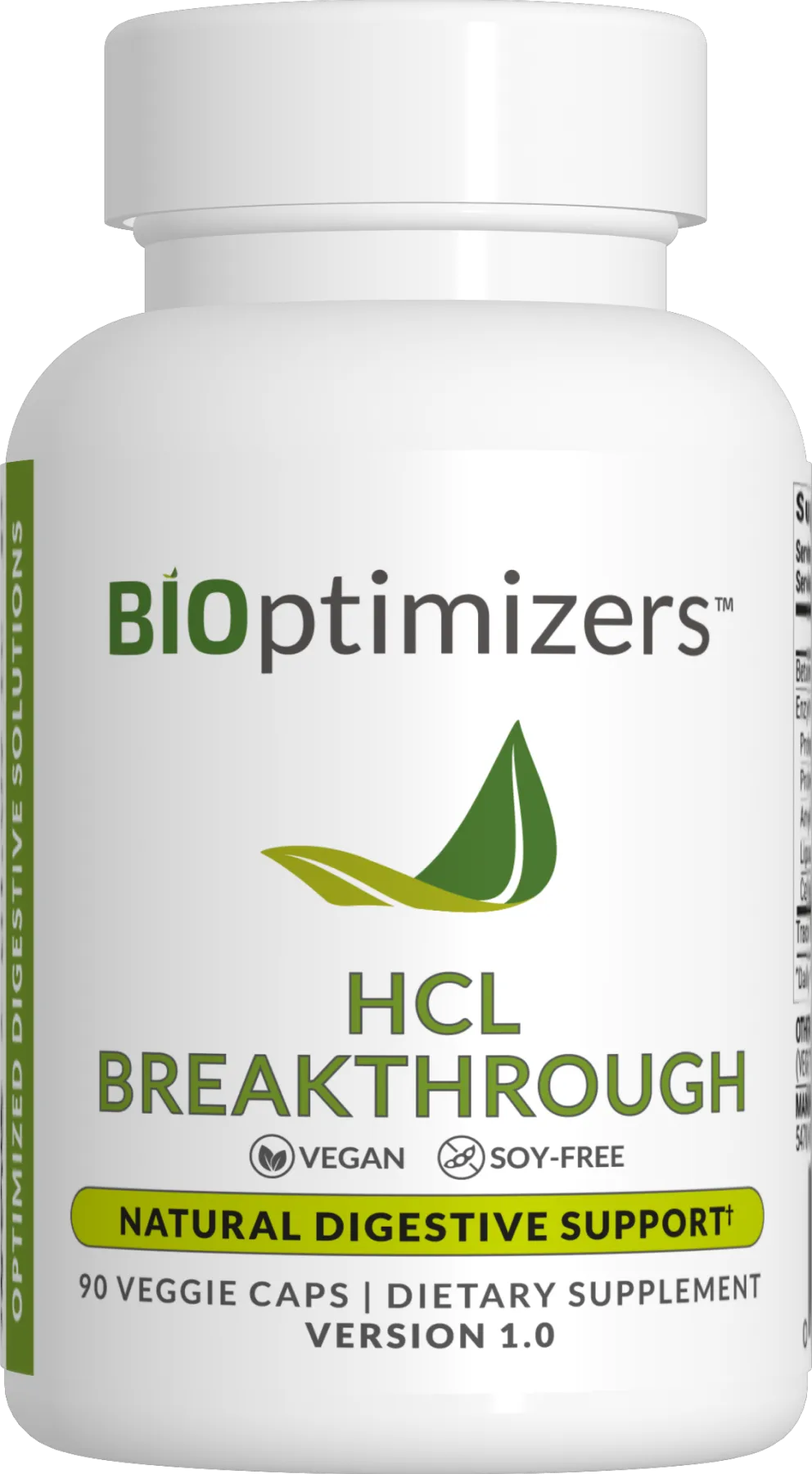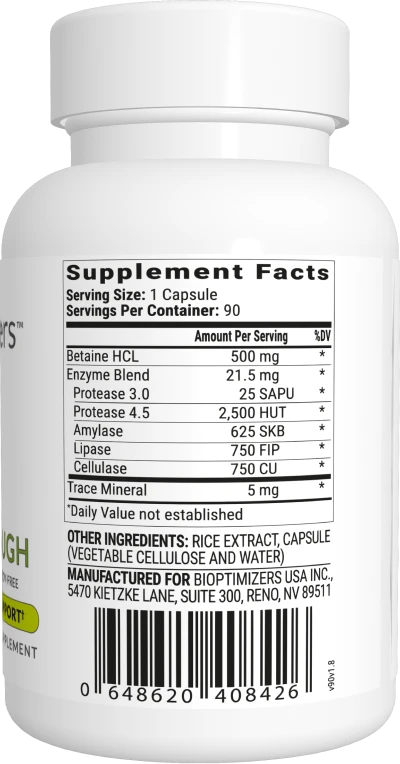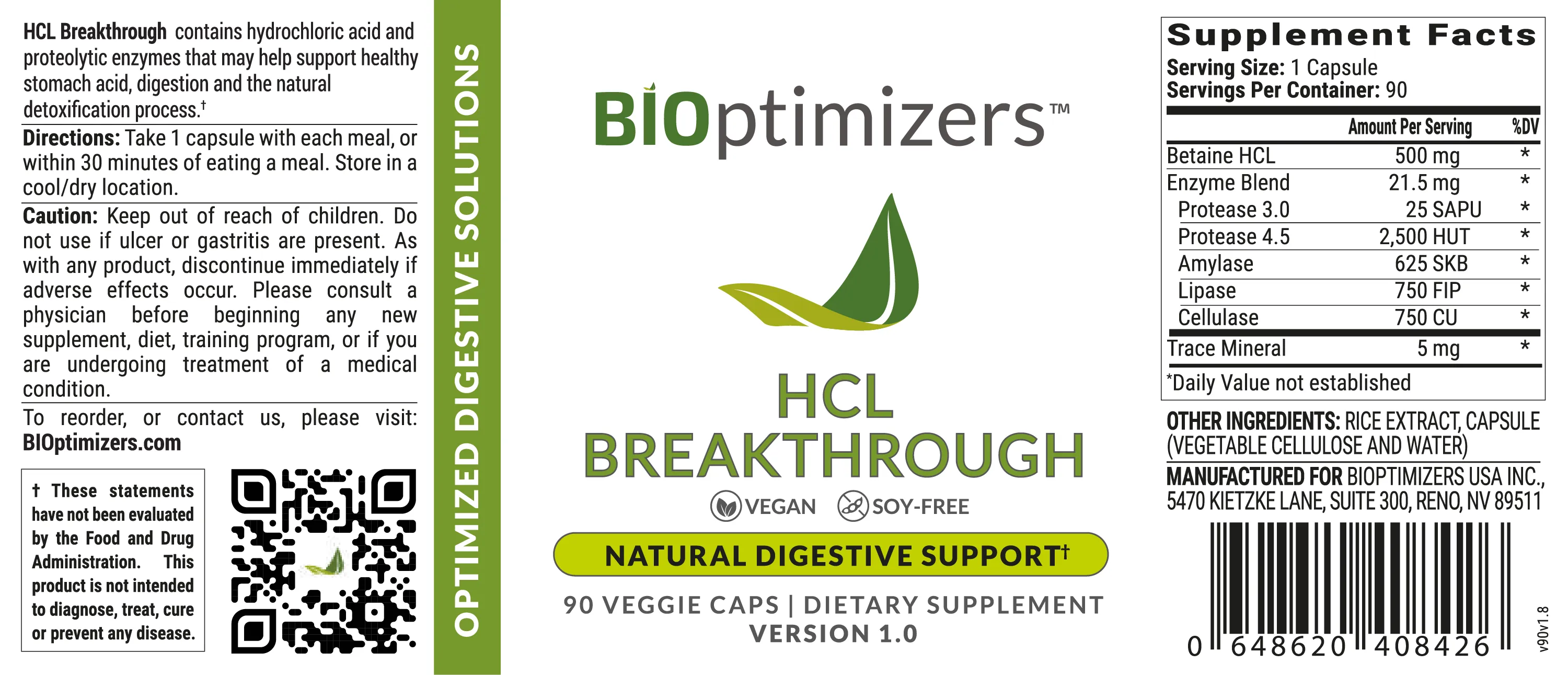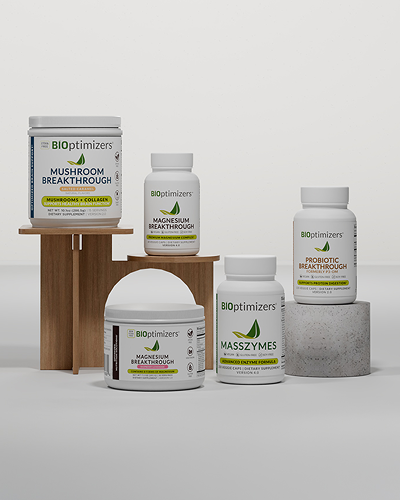Hydrochloric acid benefits and reasons your stomach needs enough of it
What If The Reason Behind Reflux & Heartburn Is LACK OF STOMACH ACID And Not An Excess Of It?
Reflux, heartburn and other gastric problems are issues millions of people suffer in silence. Medications like antacids and PPIs are widely used to deal with the symptoms, but these usually only mask bigger problems and can even worsen them[1].
Most people think their body produces too much stomach acid, which causes discomfort, but it turns out for a lot of people the problem is actually hydrochloric acid deficient[2].
YES, I WANT TO
FORGET ABOUT
HEARTBURN AND
IMPROVE
DIGESTION
Regain your healthy levels of stomach acid, while you also:
-
Improves mineral, vitamin B12 and amino acid absorption[3]
-
Better digestion, gut movement and detoxification
-
Relieves bloating, gas, belching, indigestion, post-meal fatigue and stomach heaviness or discomfort after meals
-
Improves exercise recovery and muscle growth with better protein digestion (when combined with the right diet and training)
-
Promotes healthy function of the valve between esophagus and stomach, which may help with acid reflux and heartburn
-
Promotes healthy stomach acid protection against food-borne infections

How To Know If You Have Low Stomach Acid?
The reasons that cause low hydrochloric acid can vary, the most common ones being:
STRESS

AGE

UNBALANCED DIET

MEDICATION

So you might be wondering...
How Do I Know I Have Low Hydrochloric Acid Levels?[5]
To accurately determine if you suffer from low stomach acid a medical diagnosis is needed. However, there’s a very simple test you can take at home that can give you an idea that there might be a need to increase stomach acid levels in your stomach.
On an empty stomach, mix 1/4 teaspoon of baking soda in 4 ounces of cold water and drink it. You should experience belching by minute 5, otherwise, there’s a chance that not enough stomach acid reacted with the baking soda to generate gas.
Once you determine if there might be hydrochloric acid deficiency, the next obvious step is to find out how to fix low stomach acid.
DID YOU KNOW...
It's Estimated That 20-25% Of North-Americans Suffer From Reflux?
However, the right Enzyme Supplement can amplify it up to 68%, which is more than triple what you normally assimilate.
Regain your healthy levels of stomach acid, while you also:
-
Enhance digestion with full-spectrum digestive enzymes
-
A mineral complex to enhance the activity of digestive enzymes
-
Optimizes the absorption of important minerals including iron, calcium, magnesium, zinc, copper, and manganese
-
Promotes healthy gut movement, bile flow, and enzymatic secretions
-
Helps maximize protein digestion in the stomach
-
Supports the stomach’s natural ability to protect against foodborne infections, including bacteria, viruses, yeasts, and parasites
-
Relieves indigestion, gas, bloating, belching, and fatigue after meals
-
Supports healthy closure of the valve between the stomach and esophagus


Thousands Of People Globally Already Love And Trust HCL Breakthrough To Aid With Reflux And Enhance Their Digestive Health:

Trying holistic treatment for acid reflux. It was delivered fast. Thank you.
Absolutely love this product. It makes me feel less guilty of overindulging on anything!
Love this product! So thankful I found it.
I feel better when I take two capsules with every meal. In addition, sometimes I take 3 capsules with 6 capsules of P3OM before bedtime. I like that it can be taken with meals as well as on an empty stomach. I believe it aids with digestion.
Signs And Symptoms Of Low Stomach Acid
Heartburn after a meal, irritation after eating meat or “heavy” foods, bloating, gas, irritation…
Something so vital as eating becomes a struggle when you are living with low hydrochloric acid, but the immediate discomfort could be just the beginning of way more serious issues.
Small intestine bacterial overgrowth (SIBO) and many chronic health conditions, including irritable bowel syndrome, fibromyalgia, anxiety and depression are associated with lack of stomach acid[6][7][8].
Increasing your stomach acid levels could not only prevent these diseases, but also help you enhance your digestive health and live the lifestyle you deserve by:
-
Promoting Healthy Digestive Function
-
Enhancing bowel movement
-
Increase Fat Burning
-
Increasing absorption of minerals and B12 Vitamin
-
Supporting the stomach’s natural protection against food-borne disease
Still Wondering If HCL Breakthrough Is The Right Choice To Enhance Your Digestion?

HCL or hydrochloric acid is a very strong acid produced by your stomach.
The roles of HCL include:
- Killing any potential pathogens that make its way into your stomach
- Degrading proteins and converting them so they are easier to digest
- Kick-starting the digestion, secretion, and movement throughout the digestive system
- Activating enzymes that are released into the stomach as precursors, such as pepsin, which also activate other enzymes in the stomach
- Converting minerals, such as iron and zinc, into a form that can be absorbed and used by our the body
Acid reflux is caused by the gastroesophageal sphincter (the valve between your stomach and esophagus) coming loose, allowing the stomach content to rise up into the esophagus.
Symptoms may include:
- Heartburn or a burning sensation in your chest, especially when lying down
- Chest pain
- Burping or belching
- Recurring coughs or hiccups
- Hoarse voice
- Bad breath
- Pressure in the chest
- Sour or bitter taste in the back of the throat
There are many potential causes of acid reflux. You should consult your physician or naturopathic doctor to identify the root causes and treat them accordingly.
Conventional medicine uses means to reduce stomach acid to treat acid reflux. However, incidences of acid reflux increase with age, while stomach acid decreases with age, so most cases of acid reflux are caused by low hydrochloric acid. Older adults may have delayed stomach acid secretions compared to younger adults[9].
Often, acid reflux is caused by an imbalance in the gut bacteria or small intestine bacterial overgrowth[10].
Ways to temporarily manage acid reflux include:
- Avoiding trigger foods, such as mint, fatty foods, spicy foods, tomatoes, onions, garlic, coffee, tea, chocolate, carbonated beverages, and alcohol
- Staying upright after eating and avoiding eating too close to bedtime
- Sleeping in an incline
- Managing stress
- Avoiding exercising too soon after eating
- Quitting smoking if you’re a smoker
- Losing weight if overweight or obese
- Avoiding tight-fitting clothing or belts
- Managing medications that may cause acid reflux as a side effect
- Finding an eating routine that works for you - some people do better eating smaller meals, while others three square meals per day.
- Practicing good eating hygiene, such as eating mindfully and thoroughly chewing food
- Many people find that optimizing overall digestion and microbiome relieves their acid reflux. Several BIOptimizers products, including HCl Breakthrough, provide digestive and microbiome support. However, our products are not approved to treat or prevent any conditions. You should also consult your physician before introducing any supplements or diet changes.
GERD is when acid reflux keeps recurring, at least more than twice a week.
GERD can cause inflammation to the esophagus and may lead to esophageal cancer.
Your stomach naturally produces hydrochloric acid to kill pathogens and activate digestive enzymes in the stomach. The acidity also serves to trigger gut movement and secretions of digestive juices in the intestine.
There are many causes of low HCL, including:
- Stress
- Aging
- Eating too fast or mindlessly
- Antacids*
- Stomach acid-reducing drugs (proton pump inhibitors)*
- Vitamin B and zinc deficiencies
- Autoimmune conditions that destroy the stomach lining
- Helicobacter pylori and bacterial infections
- Drinking coffee on empty stomach can injure the acid-producing cells in the stomach lining
*Always speak to your physician before stopping or making changes to your medication regimens. If you have stomach ulcer, you may need these medications temporarily to allow the ulcers to heal. Do not take stomach acid supplements (including HCL Breakthrough) if you have stomach ulcers.
- You may have HCL due to one of the causes above. As a result, the valve between the stomach and esophagus don’t get enough stimulation to close.
- You are eating trigger foods that cause acid reflux without the right support for your gut, such as coffee, citrus, red meat, or very high fat meals.
- Your post-meal posture allows for the acid to flow up the esophagus
- Slow down and eat your meals slowly and mindfully
- Correct your zinc and B vitamin deficiencies if you are deficient in these nutrients
- Use HCL Breakthrough
- Increasing the protein content of your meals
- Use digestive bitters
- Drink lemon water or apple cider vinegar 15 minutes before meals
Stomach acid is the naturally occuring hydrochloric acid produced by a type of cells that line your stomach. It serves to sterilize your food, facilitate digestion, and promote further steps of digestion.
High stomach acid is quite rare since stomach acid decreases with age. Symptoms of excess stomach acid may include stomach discomfort, especially on an empty stomach. You may also have nausea and vomiting.
However, it’s important to see a doctor to rule out injuries to the stomach lining, which may allow any level of stomach acid to irritate the stomach tissue. The following may increase the risk of stomach lining injuries:
- H. pylori infection
- Usage of drugs that reduce stomach lining protection, such as non-steroidal anti-inflammatory drugs
- Being under intense physical or emotional stress
- Alcohol drinking, especially without food
- Irregular or unhealthy eating patterns
Low stomach acid is more common and tends to have ripple effects throughout the body. Signs of low hydrochloric acid include:
- Nutrient deficiencies, such as iron or B12 deficiency anemia
- Indigestion, bloating, gas, belching, and heartburn
- Inability to gain weight
- Lack of appetite
- Catching gut infections or food-borne illnesses easily
- Irritable bowel syndrome
- Food allergies, sensitivities, or leaky gut

The Benefits of HCL Breakthrough Backed By Science
SAY GOODBYE TO HEARTBURN AND REFLUX BY INCREASING STOMACH ACID
- 1
Bavishi C, Dupont HL. Systematic review: the use of proton pump inhibitors and increased susceptibility to enteric infection.Aliment Pharmacol Ther. 2011 Dec;34(11-12):1269-81. doi: 10.1111/j.1365-2036.2011.04874.x. Epub 2011 Oct 17. PMID: 21999643.
- 2
Kines K, Krupczak T. Nutritional Interventions for Gastroesophageal Reflux, Irritable Bowel Syndrome, and Hypochlorhydria: A Case Report. Integr Med (Encinitas). 2016;15(4):49-53.
- 3
InterClinical eNews December 2018, Issue 87.Hydrochloric acid – why it’s essential for optimal digestion. Available at: https://interclinical.com.au/newsletter/hydrochloric-acid-why-its-essential-for-optimal-digestion/
- 4
El-Serag HB, Sweet S, Winchester CC, Dent J. Update on the epidemiology of gastro-oesophageal reflux disease: a systematic review. Gut. 2014 Jun;63(6):871-80. doi: 10.1136/gutjnl-2012-304269. Epub 2013 Jul 13. PMID: 23853213; PMCID: PMC4046948.
- 5
Megan D, Saurabh S. 2019. What is Hypochlorhydria. Healthline. Available at: https://www.healthline.com/health/hypochlorhydria
- 6
Ghoshal UC, Shukla R, Ghoshal U. Small Intestinal Bacterial Overgrowth and Irritable Bowel Syndrome: A Bridge between Functional Organic Dichotomy. Gut Liver. 2017;11(2):196-208. doi:10.5009/gnl16126 Lydiard RB. Irritable bowel syndrome, anxiety, and depression: what are the links?. J Clin Psychiatry. 2001;62 Suppl 8:38-47.
- 7
Lydiard RB. Irritable bowel syndrome, anxiety, and depression: what are the links? J Clin Psychiatry. 2001;62 Suppl 8:38-47.
- 8
Yago MR, Frymoyer AR, Smelick GS, et al. Gastric reacidification with betaine HCL in healthy volunteers with rabeprazole-induced hypochlorhydria. Mol Pharm. 2013;10(11):4032-4037. doi:10.1021/mp4003738
- 9
Guilliams TG, Drake LE. Meal-Time Supplementation with Betaine HCl for Functional Hypochlorhydria: What is the Evidence? Integr Med (Encinitas). 2020;19(1):32-36.
- 10
Yarandi SS, Nasseri-Moghaddam S, Mostajabi P, Malekzadeh R. Overlapping gastroesophageal reflux disease and irritable bowel syndrome: increased dysfunctional symptoms. World J Gastroenterol. 2010;16(10):1232-1238. doi:10.3748/wjg.v16.i9.1232

